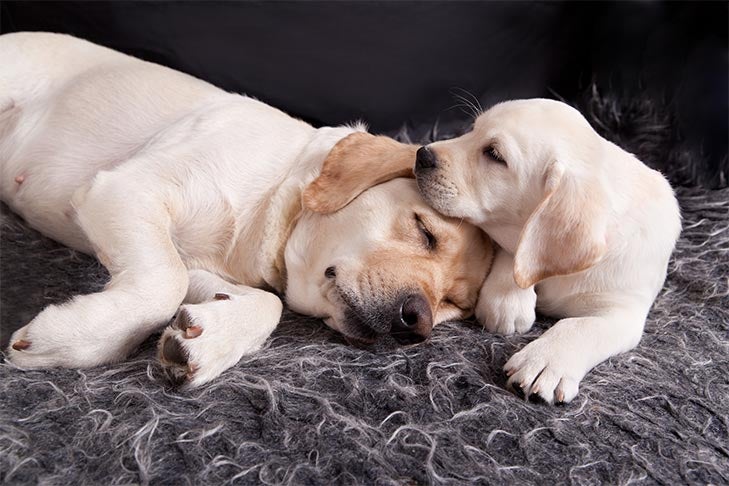Dogs Grieve Based on the Relationship
Dogs can form emotional attachments to people and to other dogs. But, just as with people, not all dogs react the same after the loss of another dog in the household. If the pups shared a very close bond, then the dog may react with behaviors that indicate depression after a furry friend passes away, says Dr. Mary Burch, a certified applied animal behaviorist with more than 25 years of experience working with dogs.
“The signs of grieving for both dogs and people can be the same,” says Dr. Burch. “Depression is a typical sign and it is characterized by changes such as sleep problems, a decreased appetite, a decrease in activity, and increased anxiety that, for dogs, manifests itself with behaviors such as panting, pacing, and sometimes the destruction of objects.”
In general, grieving dogs who have recently lost a close buddy may lose their “spark” and suddenly seem less perky, attentive, and active, says Dr. Burch. On the other hand, if the dogs weren’t close, there may be no signs of grief. “As a matter of fact, in a case where the dogs just coexisted and really did not interact much, if the owner began lavishing attention and activities on the remaining dog, the dog might actually seem happier.”
Note that there is nothing malicious about a lack of grieving behaviors in dogs, says Dr. Bekoff. Each individual dog just grieves differently.

Human emotions may also play a role: increases in the surviving dogs’ levels of fear and a reduction in food consumption were associated with greater suffering, anger and psychological trauma in the owners in response to the death.
“Dogs do form emotional bonds, and hence the loss of a companion animal in their household can be expected to cause behavioural changes, like those we recorded in our study, which overlap what we normally interpret as being grief and mourning,” she said. “Of course, based on our results we still cannot tell whether these dogs were responding only to the ‘loss’of an affiliate, or to their ‘death’ per se.”
The researchers said there were a number of possible explanations for the findings, including that the death may have disrupted shared behaviours for the surviving dogs.
The results also revealed behavioural changes were stronger for dogs that were reported to have had a friendly relationship with the animal that had died, or who had been their parent or offspring.
Expressions of grief are not unique to humans: great apes, dolphins, elephants and birds are among species that have been observed to take part in rituals around death and appear to mourn.
Stick to Your Routine
No matter how your dog reacts to the loss of another dog, he is probably feeling some kind of stress over the changes in the household. One of the best ways you can help your dog adjust to the loss, is to stick as carefully as possible to his normal routine. Continue feeding him and walking him at the same time. Sticking to the usual schedule can help a great deal in reducing his stress. Keeping on a routine can also help you cope with your own grief.
✝ How To HELP A DOG Cope With THE DEATH Of Another DOG
A new study confirms our pets can have heartbreaking reactions to the loss of a canine companion.
I was at a small housewarming party recently where a guest arrived late, looking harried. She explained that one of her dogs, Max, had recently passed away, and her second dog, Penny, was taking it pretty hard. Penny had always struggled with anxiety, but with consistent care and training had made tremendous progress over the past couple of years. Now, without Max around, she was reverting to her old ways. She was eating less, didnât play as much, wouldnât engage with the other dogs at daycare, and was having accidents in the house. (Pennyâs mom had to clean up one of these accidents before she left, which was why she was late.)
According to a recent paper published in the journal Scientific Reports, Pennyâs behavior is not unusual. The study looked at data collected from 426 adults with multiple pet dogs and found that surviving dogs who lost a canine companion showed âgrief-related and emotional patterns.â The most common behaviors owners reported were attention seeking (67 percent); playing less (57 percent); a decline in activity (46 percent); sleeping more (35 percent); increased fearfulness (35 percent); eating less (32 percent); and increased vocalization, like barking and whining (30 percent).Â
Of those participants who noticed a negative behavior change in their surviving dog, about a third said it lasted between two and six months after the death of their companion, 29.4 percent said it lasted less than two months, and 24.9 percent said it lasted over six months.Â
The study also found that the amount of time the dogs had spent together had no effect on the surviving dogâs likelihood of exhibiting negative behavior. A much stronger predictor, they found, was the quality of the dogsâ relationship. Dogs were far more likely to play less and show disrupted feeding patterns if their relationship with the deceased pup had been described as âfriendly,â rather than âagnosticâ or âmutual tolerance.â